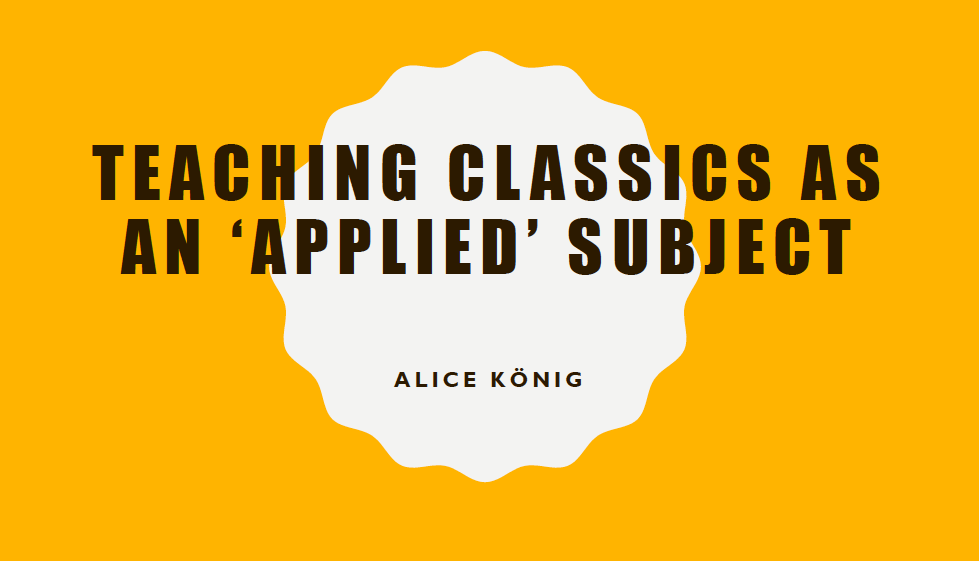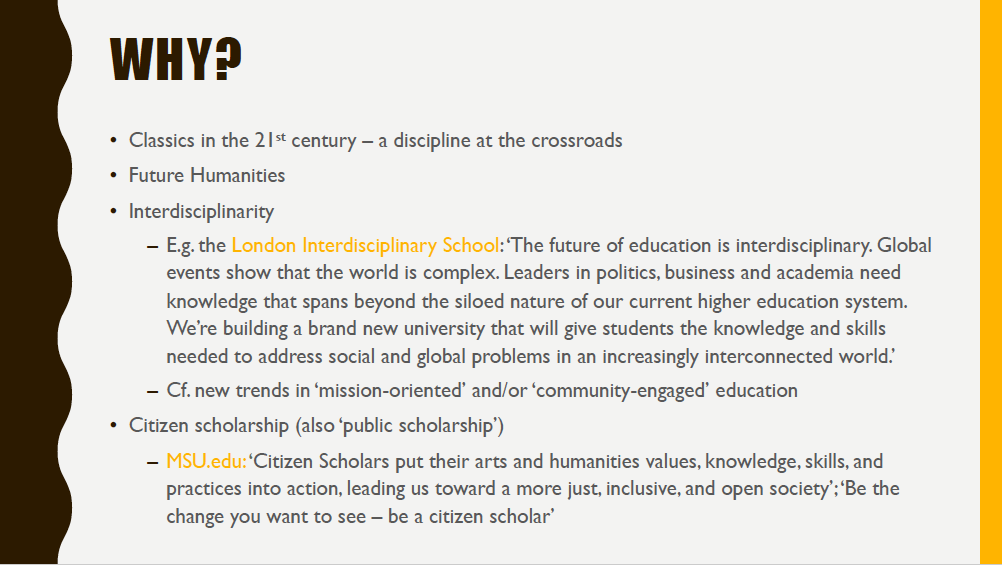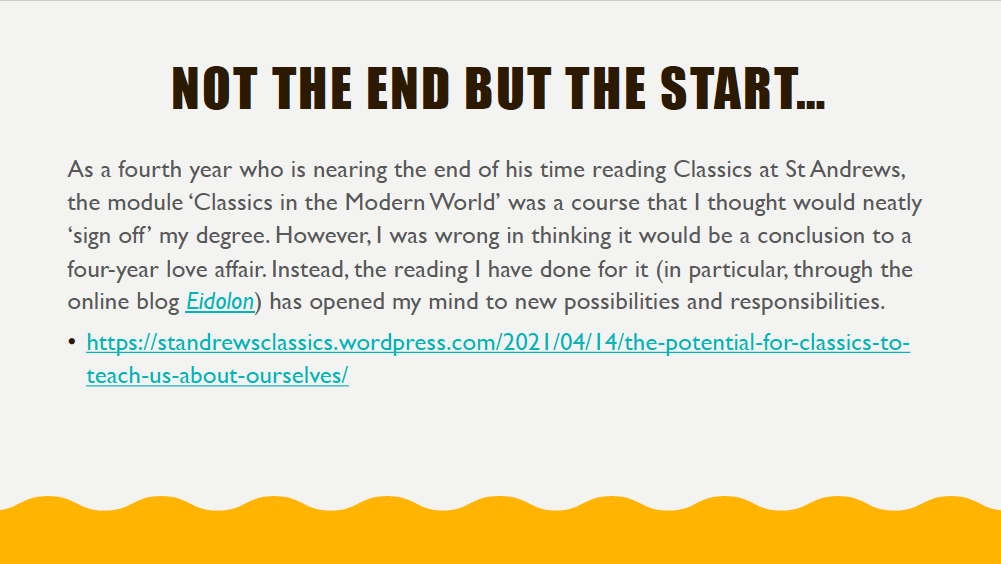Teaching Classics as an Applied Subject

What does the future hold for the discipline of Classics? And what has Classics got to offer future generations?
In recent years, students and staff in many different Classics departments have been reflecting on its past limitations and future possibilities.[i] As scholars like Dan-el Padilla Peralto have argued, the study of Classics has long been implicated in multiple forms of racist and colonial thinking;[ii] it has been harnessed by different groups to promote or excuse acts of imperialism, inter-group discrimination, and misogyny (among other evils);[iii] and it has long been a tool in ‘class warfare’, deployed by socio-economic elites in the exclusion or marginalisation of others.[iv]
At its best, however, Classics can help challenge and address these and other such pernicious problems. Many working within the discipline have been finding increasingly creative and impactful ways to combine study of the ancient world with critical consideration of pressing social, cultural and political issues. Take, for example, Helen Morales’ recent book Antigone Rising. Drawing lines of connection between ancient Greek myth, contemporary forms of misogyny, other gender discrimination, and the ‘Me Too’ (or metu) movement, it explores sensitive ways of tapping into Greek mythology as part of the solution and not just part of the problem. Elena Isayev, meanwhile, has been drawing on her study of ancient experiences of migration and displacement to inform modern debates, policy-making and practice in this challenging space.[v] Using quite different media, Neville Morley not only calls out misuses of ancient history in modern political debates (e.g. via his Twitter handle, The Thucydides Bot @Thucydiocy) but has also developed interactive, drama-based ways of engaging with ancient Greek history to increase political literacy and deepen our understanding of the dynamics of power, justice and negotiation. The list could go on.[vi]
These forms of ‘Applied Classics’ are emerging at a time when the appetite for ‘citizen scholarship’ and ‘mission-oriented’ learning is clearly rising. Institutions like the London Interdisciplinary School and the Edinburgh Futures Institute have been developing degree programmes based not around disciplinary specialisms but on the development of skills like interdisciplinarity, teamwork and real-time problem-solving that are vital for addressing cross-cutting challenges such as a global pandemic. Heightened awareness amongst researchers of the value of – and need for – more dialogue between scholarship and society has coincided with a digital revolution that has made ‘public history’ and ‘citizen science’ more feasible than ever. And today’s college and university students find themselves combining academic study with work-place internships, community volunteering and multiple forms of activism. While they still enjoy diving deep into their chosen degree subjects, many welcome opportunities within the curriculum to build bridges between their studies and the wider world and to experiment with different ways of ‘applying’ their learning to contemporary issues.

Within the School of Classics Dr Alice König leads an award-winning Honours module that enables students to do exactly that. Launched in 2020, ‘Classics for the Modern World’ challenges students to research ways in which our study of antiquity might help address pressing modern issues, such as climate injustice, fake news, or vaccine hesitancy (to name just a few). It places a strong emphasis on students’ development as citizen scholars, encouraging them to think of ways in which they can productively ‘apply’ their learning to real-world problems and make positive interventions on issues that matter to them. In the process, it encourages lots of meta-study, as students reflect on different approaches to engaging with Classics and the value and potential impact of Humanities subjects more broadly. Students also hone important ‘soft skills’, such as responsible debate, inclusive listening, delegation, outcomes-focused planning, market-research, and impact-analysis.
Each semester, guest lecturers with tried-and-tested experience of doing ‘Applied Classics’ deliver workshops outlining the ways in which they have brought ancient material into dialogue with modern challenges. A professional drama group might discuss the pitfalls and potential of adapting Greek and Roman drama to challenge entrenched habits of visualising war and peace, for example; or a historian of science might examine what we can learn from ancient constructions of expertise and authority as we address contemporary mistrust of certain kinds of expert/expertise or the marginalisation of certain kinds of voices in political debate. Case studies look at the misuse of antiquity (for example, misapplications of Greek political models in contemporary international relations theory and practice; the citation of false parallels in discussions of ancient and modern slavery; or the risks inherent in comparing ancient and modern forms of climate change), alongside examples of more successful applications.
Through critical analysis of different methodologies, students gain valuable insights into the practical and ethical challenges – as well as the opportunities – of translating their academic work into impactful forms of community engagement. They then work in teams to identify a local, national or global challenge that matters to them (e.g. the gender pay gap, conflicting attitudes to free speech, intercultural tensions in the local community, political polarisation, etc) and together research ways in which study of the ancient past might make a positive contribution to their chosen issue. They capitalise on the inherent interdisciplinarity of Classics, drawing on different team members’ knowledge of language and literature, material culture, philosophy, and social/political/economic/environmental history; and they are also encouraged to look beyond their Classical expertise as they pool other disciplinary knowledge and extra-curricular skills.
In devising and pitching a viable project that brings ancient material to bear on a pressing modern problem, the students who take this module gain new insights into antiquity itself. Through blog-writing and the development of physical and online exhibitions, they are able not just to read about but to contribute actively to ongoing debates about the future of Classics as a discipline. And as they report themselves, the chance to do ‘Applied Classics’ can be a very empowering experience, giving students a sense of ownership over their studies and an awareness of wider possibilities, and even inspiring future activism. In the words of a former student:
Applied Classics encourages us to think beyond our current notions regarding the uses of Classics, to fight against age-old stereotypes concerning the discipline and to apply our knowledge to implement serious change in the modern world. I chose to take the Modern Classics module for entirely selfish reasons. As a student within the School of Classics, I have had to justify my chosen degree subject numerous times to various people over the years. There are only so many times you can be asked, by schoolteachers and students alike, ‘what’s the point?’ and ‘what job do you expect to get with that?’. With this module, I thought I could finally provide some solid examples of the real-world applications of my Classical Studies degree. I wanted to feel vindicated but already it has done more than that: I have been vindicated, but I have also been radicalised [in a good way!].
Another student reported:
As a fourth year nearing the end of his time reading Classics at St Andrews, the module ‘Classics for the Modern World’ was a course that I thought would neatly ‘sign off’ my degree. However, I was wrong in thinking it would be a conclusion to a four-year love affair. Instead, the reading I have done for it… has opened my mind to new possibilities and responsibilities.
And another took these lessons from the module:
This semester, I have gained a clearer understanding of the power and reach of Classics in the modern world; but I have also learnt about the social and ethical responsibilities that come with being a ‘citizen scholar’, and how important it is to be attuned to and wary of abuses of the discipline.
Read more reflections by former students of Modern Classics below. And please browse our website to explore some of the Applied Classics projects which student teams have devised!
Alice König, 2022
Reception and application in classical studies Applying ancient materials to modern contexts What does applied Classics mean? Distance and proximity to the Ancient World

[i] For a sample, see e.g. Changing Classics to Save Classics? A View from Below and Classics, Postcritique and On Not Apologising for Teaching and Promoting “Classics”.
[ii] See also multiple articles in Eidolon.
[iii] Donna Zuckerberg’s Not All Dead White Men (Harvard 2018) is a sobering read in this regard.
[iv] Charlotte Higgins analyses a serial offender in this article. For more progressive work on the intersection between Classics and class, see e.g. A People’s History of Classics and Network for Working-Class Classicists.
[v] For a sample of her work, see e.g. Displacement and the Humanities and Routes.
[vi] Further reading might include: Chaniotis, A., Kuhn, A., Kuhn, C. eds. (2009) Applied Classics: comparisons, constructs, controversies, Stuttgart; Harrison, Stephen & Hardwick, Lorna (eds). Classics in the Modern World: a democratic turn? Oxford, 2014; Morley, N. (2018) Classics: why it matters, Cambridge; Beard, M. (2013) Confronting the classics: traditions, adventures and innovations. London; E. Eidinow & K. Lorenz (2020), ‘Ancient Myths and Modern SMEs’, Organisational Aesthetics 9.1, pp. 41-52; E. Eidinow & Ramirez (2016) ‘The aesthetics of story-telling as a technology of the plausible’, Futures 84, 43-9; My Classics Will Be Intersectional, Or…; and Can Public Scholarship Save Your Life?.